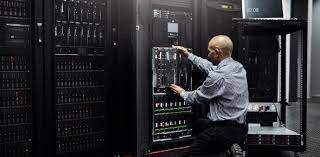Field Technician Networking And Storage

Introduction: In the digital age, where connectivity and data management are paramount for businesses to thrive, the role of field technicians specializing in networking and storage is more critical than ever. These professionals are the backbone of ensuring seamless operations, maintaining infrastructure integrity, and troubleshooting issues that arise in complex network environments. In this article, we delve into the significance of field technicians in networking and storage, exploring their responsibilities, skills, and the evolving landscape of their profession.
The Role of Field Technicians in Networking and Storage: Field technicians specializing in networking and storage play a multifaceted role in modern organizations. Their primary responsibilities revolve around the installation, configuration, and maintenance of networking equipment and storage systems. Whether it’s setting up local area networks (LANs), wide area networks (WANs), or managing data storage solutions such as servers and cloud-based platforms, these technicians ensure that businesses remain connected and their data remains secure.
Networking tasks may include installing routers, switches, and firewalls, as well as running cables and establishing connections between devices. Meanwhile, storage-related duties often involve setting up storage arrays, configuring RAID (Redundant Array of Independent Disks) configurations, and implementing data backup and recovery strategies. Field technicians must also conduct regular inspections, perform upgrades, and troubleshoot any issues that may arise to minimize downtime and maintain optimal performance.
Skills Required for Field Technicians: Field technicians in networking and storage require a diverse skill set to effectively fulfill their responsibilities. Some of the essential skills include:
- Technical Proficiency: Proficiency in networking protocols, hardware components, and storage technologies is fundamental. This includes knowledge of TCP/IP, VLANs, VPNs, SAN (Storage Area Network), NAS (Network Attached Storage), and RAID configurations.
- Problem-Solving Abilities: Field technicians must possess strong problem-solving skills to diagnose and resolve network and storage issues efficiently. They should be adept at troubleshooting connectivity issues, identifying hardware failures, and implementing solutions promptly.
- Attention to Detail: Given the complexity of networking and storage environments, attention to detail is crucial. Technicians must meticulously follow installation procedures, document configurations, and ensure that all components are functioning correctly to prevent potential issues down the line.
- Communication Skills: Effective communication is essential for field technicians, especially when interacting with clients, colleagues, and vendors. They must be able to articulate technical concepts clearly, provide status updates, and collaborate with other team members to address challenges effectively.
- Adaptability: The field of networking and storage is constantly evolving with advancements in technology. Field technicians must stay updated on the latest trends, tools, and best practices to adapt to changing environments and meet the needs of their organization.
The Evolving Landscape: As businesses increasingly rely on digital infrastructure to operate efficiently, the demand for skilled field technicians in networking and storage continues to grow. Moreover, the emergence of technologies such as cloud computing, virtualization, and software-defined networking (SDN) has transformed the way organizations manage their networks and storage resources.
Field technicians must stay abreast of these developments and acquire new skills to remain relevant in the industry. For instance, proficiency in cloud platforms like AWS (Amazon Web Services) or Azure and familiarity with virtualization technologies such as VMware or Hyper-V have become valuable assets for technicians working in modern IT environments.

Furthermore, the shift towards remote work and decentralized operations has posed new challenges for field technicians. With employees accessing corporate networks and data from various locations, ensuring network security and data privacy has become a top priority. Field technicians must implement robust security measures, such as encryption, multi-factor authentication, and intrusion detection systems, to safeguard against cyber threats.
Conclusion: Field technicians specializing in networking and storage play a vital role in maintaining the backbone of modern businesses. Their expertise ensures that networks remain operational, data is stored securely, and communication flows seamlessly across organizations. As technology continues to evolve, field technicians must adapt to new challenges and acquire the necessary skills to meet the demands of the ever-changing landscape. By staying updated on industry trends, honing their technical abilities, and fostering effective communication, field technicians can continue to serve as invaluable assets in the digital age.
